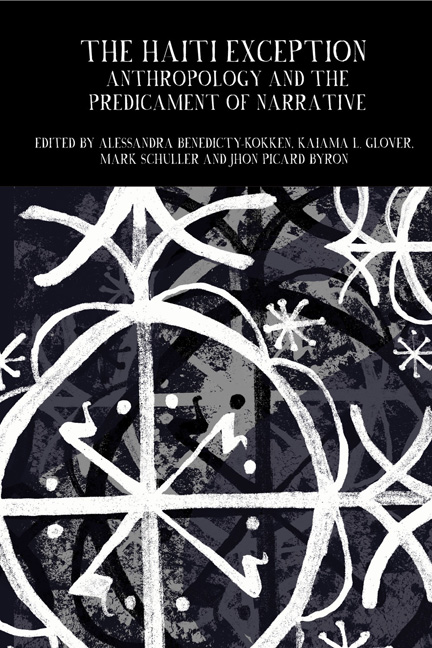Book contents
- Frontmatter
- Contents
- Editors’ Introduction
- I Tracing Intellectual Histories
- II Interrogating the Enquiring Self
- ‘Written with Love’: Intimacy and Relation in Katherine Dunham's Island Possessed
- Dance, Haiti and Lariam Dreams
- ‘Haitian Art’ and Primitivism: Effects, Uses and Beyond
- III On Nation-Building: Histories, Theories, Praxes
- Epilogue: Kalfou Danje: Situating Haitian Studies and My Own Journey within It
- Notes on Contributors
- Index
Dance, Haiti and Lariam Dreams
from II - Interrogating the Enquiring Self
- Frontmatter
- Contents
- Editors’ Introduction
- I Tracing Intellectual Histories
- II Interrogating the Enquiring Self
- ‘Written with Love’: Intimacy and Relation in Katherine Dunham's Island Possessed
- Dance, Haiti and Lariam Dreams
- ‘Haitian Art’ and Primitivism: Effects, Uses and Beyond
- III On Nation-Building: Histories, Theories, Praxes
- Epilogue: Kalfou Danje: Situating Haitian Studies and My Own Journey within It
- Notes on Contributors
- Index
Summary
I should perhaps begin with a disclaimer of sorts. I don't consider myself by any means a specialist in the history, religion or arts, broadly speaking, of Haiti – though many Haitian artists, scholars, religious practitioners and political figures have influenced my own scholarship, beliefs and artistic practice. Haiti has figured in my own work in ways that resonate with the work of US-based dance figures whom I'll consider in this essay, and if I trace here some of the troubling or disconcerting moments in their own texts, I am surely equally implicated. But I don't disavow the impulse – neither theirs nor my own – to try to fathom the interpenetration of Haiti's aesthetic, spiritual and political experimentation with our own.
Experimental dance practice, as well as dance scholarship, here in the US has been remarkably inflected by Haiti – as a choreographic source, but also as an imaginary, both spiritual and political. The extraordinary Katherine Dunham (1909–2006) spent much of her life researching and living in Haiti, and the movement technique to which she would give her name was deeply indebted to the dance vocabulary she learned in the hounfor, that is, the inner sanctuary wherein ceremonies take place. She wrote about her experiences in Haiti in both ethnographic and autobiographical texts (often blurring the lines between the two), and throughout her life was a committed activist in support of Haitian causes. Maya Deren (1917–61) was drawn to Dunham's work, and served for a time as her assistant, later spending time in Haiti performing her own research and compiling footage for experimental films. It was through Haitian dance that Deren would begin to consider the temporal dimensions of trance, which she would go on to employ in her groundbreaking work on dance in film. The third figure I will look at here is Ralph Lemon (1952–), a conceptual artist who emerged from the world of experimental dance and found himself drawn, midway through his artistic trajectory, to consider the relationship of his work to both Africa and the Caribbean.
- Type
- Chapter
- Information
- The Haiti ExceptionAnthropology and the Predicament of Narrative, pp. 110 - 119Publisher: Liverpool University PressPrint publication year: 2016



